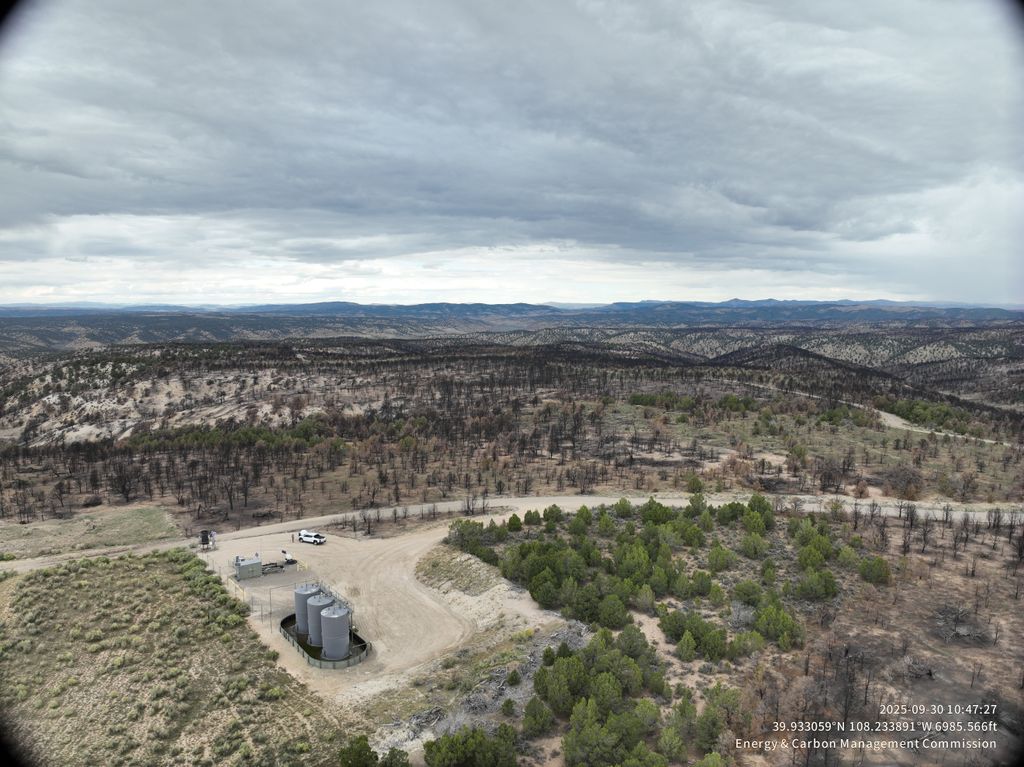Fire Management and Prevention
Colorado has some of the strictest requirements in the nation to prevent fires at oil and gas locations. When emergencies do arise, ECMC helps to coordinate with local jurisdictions, state agencies and first responders to minimize the impact to public safety and the environment. Following an explosion or fire, ECMC is also responsible for assessing environmental impacts and ensuring restoration is completed and overall compliance is regained before operations resume.
If you witnessed a fire near an oil and gas operation, please call 911. ECMC is not a first responder and defers to local first responders in the event of an emergency. If you want to report an extinguished fire at an oil and gas location, please submit a detailed description of the complaint on our website.

An ECMC drone photographed an oil and gas operation within the Lee Fire burn area. Rules require sites to be well-kept to provide a buffer between brush and fire-resilient equipment. Lease roads also enable access for emergency responders, aiding suppression and rehabilitation efforts.
Given the presence of flammable gases and liquids at well sites — including methane and liquid hydrocarbons — ECMC requires that operators follow specific rules related to their development, management, and operation (600 Series). In addition to federal requirements, our agency has formally adopted standards established by expert safety organizations, such as the National Fire Protection Association (NFPA) and the American Petroleum Institute (API), to mitigate the risk and severity of fires.
For example, operators must maintain safe distances between potential sources of ignition and drilling equipment or storage tanks to prevent fires. Sources of ignition, like combustion engines, cigarettes or transformers, are either prohibited or relegated to designated areas. Work involving an open flame or the production of sparks, otherwise known as “hot work,” requires rigorous preparation, monitoring, and post-work inspection. All operator staff must be familiar with the location and proper use of readily available fire extinguishing equipment. ECMC’s complete requirements related explicitly to fire prevention and protection are provided in rule 610.
Operators must maintain and submit an emergency response plan for approval by the local emergency response agency, as specified in rule 602(j). The plan ensures that an operator has all relevant emergency contacts for the jurisdiction on file and outlines the steps that would be taken in an emergency. In the case of a fire or another event threatening public safety, in addition to notifying the local fire department and the immediate report of the incident, oil and gas operators are required to submit an Accident Report to the ECMC Director and the local government. Once a report is made, ECMC will conduct an investigation and, if necessary, take enforcement action against the operator, including corrective action or penalties.
The threat of natural disasters, such as wildfires, can be heightened by the risks associated with well sites, where flammable materials are present. However, by following proper procedure, the risk to human welfare and the environment is lessened. ECMC’s regulatory approach to emergencies ensures that operators take all necessary steps to prevent impacts. In fact, during wildfire events, oil and gas locations, with their unvegetated working pad surfaces, regular maintenance and good housekeeping, provide effective buffers between stored flammable materials and an advancing fire. Oil and gas operators proactively take measures to shut-in operations ahead of wildfire events, often utilizing remote shut-in capabilities, and, if possible, removing produced fluids from locations to minimize impacts should a wildfire move through active oil and gas development areas.
In the case of an emergency, ECMC does not act as first responders or in a search and rescue role. Rather, our agency allows emergency responders to complete their work. At the same time, ECMC leadership and staff play a facilitatory role, gathering information and disseminating directives to and from operators, coordinating with partners at all levels of government, providing expertise, and communicating with the public. More information about the agency’s responsibility during an emergency is specified in ECMC’s emergency response plan.
An operator’s approach to an emergency may vary based on their emergency response plan, but safety is always the top priority. Plans are created in collaboration with local governments, often including evacuation routes, local first responder contacts and an outline of steps to take in case of an emergency. Operators must have dedicated access lanes for emergency vehicles and well sites and access roads must be kept clear of weeds and other debris.
The code adopted from the NFPA (NFPA Code 30, 2018 ed.) requires operators to implement fire-resilient design for storage tanks, meaning that the equipment can withstand prolonged exposure to fire without the risk of igniting the contents inside. Blowout-prevention equipment, including valves, pipes, and other drilling equipment, is required to meet API standards and is frequently tested to ensure performance. (Note: All codes adopted from third-party organizations are available to the public at ECMC’s offices.)
Despite these precautions, wildfires and other natural disasters still pose risks. If equipment is compromised, resulting in a spill or onsite fire, ECMC will conduct a thorough inspection of the site once the danger has passed. Following the inspection, ECMC will work with the operator to address any environmental impacts through a stringent site investigation and remediation process.